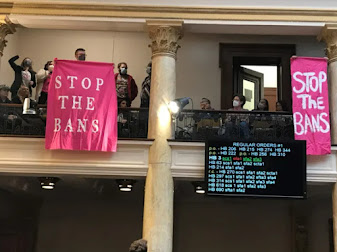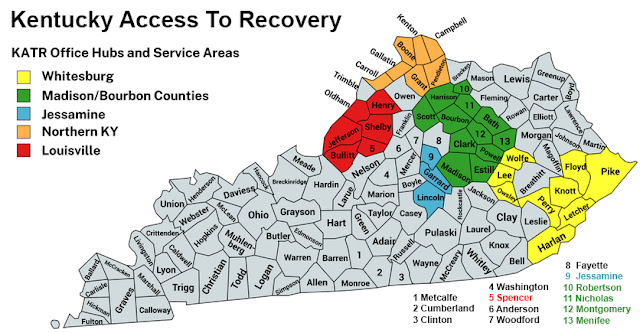By Melissa Patrick
Kentucky Health News
Legislation aimed at getting able-bodied adults off Medicaid and other public-assistance programs and back into the workforce, and decreasing fraud in the programs, has passed the General Assembly in a watered-down form.
 |
| Rep. David Meade, R-Stanford |
The Senate made several changes that made the bill less restrictive and passed it 24-12. The House concurred with the changes and sent the measure to Gov. Andy Beshear on a 70-22 vote.
The Senate adopted an amendment by President Pro Tem David Givens, R-Greensburg, with three changes that further eased some of the restrictions.
The changes would allow fluctuating income data to be used when determining eligibility, instead of the most recent data available; let Medicaid applicants self-attest their personal information as a last resort to determine their eligibility; and allow the Cabinet for Health and Family Services to apply for a waiver of work requirements in the Supplemental Nutrition Assistance Program under certain circumstances when the legislature is not in session.
The bill would still require more documentation since self-attestation is to be used as a last resort and that could create a hardship for many Kentuckians, said Emily Beauregard, executive director of Kentucky Voices for Health: "It creates roadblocks; it creates major delays."
Beauregard said in a letter to the many advocates who opposed the bill that the changes go "a long way in mitigating some of the more harmful provisions of the bill." However, she told Kentucky Health News, "We still continue to oppose the bill."
Asked his biggest concern when it comes to the new Medicaid requirements, Cabinet for Health and Family Services Secretary Eric Friedlander said, "The increased red tape for individuals."
Senate Minority Leader Morgan McGarvey said in the floor debate that he appreciated Givens' changes, but still opposed the bill because it could keep tens of thousands of Kentuckians from receiving benefits.
"I think this does make this a better bill," said McGarvey, D-Louisville. "I think the overall bill is still lacking. I thinks it is still punishing people, potentially punishing people just for being poor."
Sen. Ralph Alvarado, R-Winchester, who carried the bill in the Senate, said, "The only way you can lose benefits is if you’re doing something illegal or [are] able-bodied with no dependents at home."
The latter part of that became less certain with one Senate change. It would give the cabinet one year to implement a "community engagement" program for able-bodied adults without dependents who have been enrolled in Medicaid for more than a year, but one without the specific requirements of the original bill.
The original would have required the cabinet to seek a federal waiver to let Kentucky Medicaid require able-bodied adults not primarily responsible for a dependent to participate in at least 80 hours a month of "community engagement," including work. Federal courts say federal law doesn't allow that, but the House bill would have required the cabinet to apply annually, subtly hoping for a political change in the federal government that would allow it.
The final version would make the cabinet implement the program "to the extent permitted under federal law" but does not specify a number of hours or a work requirement, leaving the details to the cabinet.
Beauregard told Kentucky Health News that they could support voluntary community-engagement programs because they are great ways to help people get back to work or find better jobs, especially if combined with child-care and transportation support.
The bill would also make the Education and Workforce Development Cabinet establish a job-placement assistance program for adults on Medicaid who are able-bodied and not primarily responsible for a dependent.
It would also create a task force to study the "benefits cliff," the great adjustment faced by many people who go off public assistance but still lack the resources to access health care and other needs.
Even though she voted against the bill, Rep. Angie Hatton, D-Whitesburg, told her House colleagues that the Senate changes allayed many concerns of health advocates.
"I just think it's a matter of what keeps you up at night," she said on the House floor. "For me, it doesn't keep me up at night worrying that there's a tiny percentage of people who might get benefits who didn't deserve them. What keeps me up at night is worrying that there might be people hungry, who couldn't jump through hoops and get their benefits."
Meade disputed Hatton's assertion, saying a study by the Gatton College of Business and Economics at the University of Kentucky shows that it costs the federal government $1.86 billion and Kentucky taxpayers $186 million per year to pay for all Kentuckians who are enrolled in Medicaid improperly.
He said Kentucky ranks third in the nation for the biggest increase in improper Medicaid enrollment under the Patient Protection and Affordable Care Act. "You can see that we actually do have a major problem in this state," he said, "and that is what we are going to try to start taking care of."
Here are some other provisions related in HB 7 related to Medicaid:
- After the federal government lifts the pandemic-era limit on the state's ability to disenroll people, the health cabinet would have 12 months to do a full audit of the Medicaid rolls.
- Medicaid coverage for treatment of substance-use disorder for prisoners, included in the 2020 budget, would be put into law.
- The cabinet could not make approve someone for Medicaid under presumptive eligibility before their qualifying paperwork is completed.
- The bill would ban the cabinet from developing a state basic health program for low-income people not eligible for Medicaid without first obtaining specific legislative authorization.
- The cabinet must must seek a federal waiver to authorize anything it needs to implement the legislation, tell the legislature if it is denied, and reapply "with or without modifications based on instructions from the General Assembly."
- The task force would investigate and report on the cost of using a single electronic benefits card for Medicaid and the Supplemental Nutrition Assistance Program, formerly food stamps.
- The attorney general, currently Republican Daniel Cameron, could bring action against the cabinet if he thinks provisions of the bill are not appropriately implemented.




















